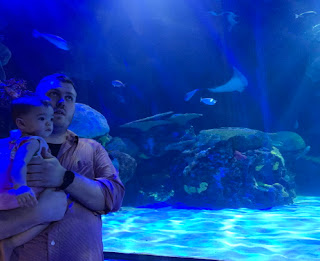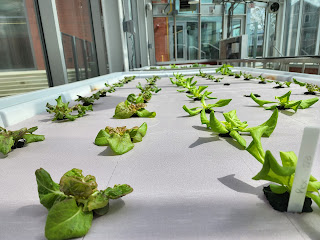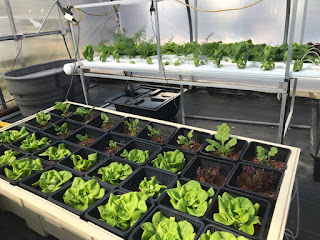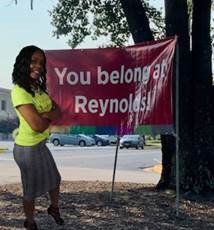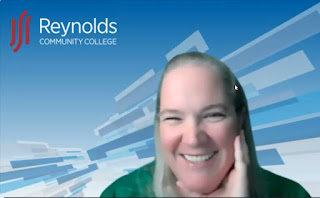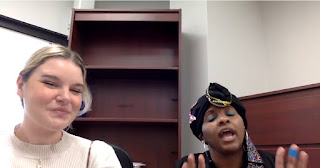FWS: Successes Prove its Value
Programs are just programs until names, faces, and successes prove their value.
The Federal Work Study program (FWS) is a great example. The program was started in 1964 during the presidency of Lyndon Johnson. Now, just shy of its 50th Anniversary, the program has been around so long it’s like electricity – you wouldn’t really notice it unless it got cut off.
But at a time when enrollment and student retention are the most important goals Reynolds confronts, programs like FWS and the lives its impacted, should get a closer look. And what better time than National Student Employee Appreciation Week, April 11 to 15, to pay tribute to the FWS program through the lives of four Reynolds staff members.
Meredith Kane, Maria Clarke, Rachel Hoke, and Kanika Morris embody the original spirit and intention of FWS – to stimulate and promote part time employment for students with financial need in higher education.
To say these four women are advocates of the program is not quite strong enough. Their lives have radically changed course as a result of their participation, and they all express great gratitude for the opportunity.
Meredith Kane
Meredith came to Reynolds in 2019 as a part-time Financial Aid Specialist. Just as the Covid pandemic was in full swing in July 2020 she was hired full time as a Financial Aid Technician and was also given the role of FWS Coordinator. Before coming to Reynolds Meredith was working in retail merchandising management for two large department stores.Meredith’s smile lights up when she talks about FWS and the students. Her connection to the program is personal. Before taking her job here at the college she knew first hand about the federal work study program. When she was in college at Virginia Tech she was a student worker. She worked in the Virginia Tech library sorting government documents which helped pay for her housing until she graduated.
“Many of the students in the program have limited or no prior work experience,” Meredith said. “These positions are opportunities for students to learn new skills including critical thinking, customer service, organization, time management and communication. When students graduate these skills can be used to build their resumes. Employers are impressed to see students who have job experience and who have worked while attending school, making FWS students more competitive and attractive to employers.”
And the benefit for Reynolds? “FWS students add value to the department they work in,” Meredith continues. “They are able to give feedback to supervisors and staff though student’s “eyes” – a perspective that might have previously been overlooked. Having a FWS student in your department is a great reminder that we are not just here for students to complete classwork, but we are here to also establish a foundation with real world skills for them to be successful beyond the classroom."
"Perhaps most important, work study students are more likely to complete their academic programs and have a greater sense of belonging in the college community. They stay on campus longer during the day. They are more dedicated and invested because they have the chance to develop deeper relationships with faculty and staff who continually check in with them to find out how they're doing.”
Maria Clarke
Maria's first comment is: “I am so honored to have been given the opportunity to work as a work study student.” The experience gave her career a 180 degree turn and changed her future. She has a degree in accounting, but life didn’t take her down that path.When Maria came to Reynolds as a student she immediately went into the Work Study program in the Financial Aid Department. There she stayed in that department for the next 15 years. “At the time I started I had a single focus. I was going to be an accountant and work with numbers. But I like helping people. The work study changed me. Six months after working as a work study I was offered a part-time position as a Financial Aid Technician. Soon after I was offered a full-time position as a Financial Aid Advisor. Then, in 2014 I was promoted to Financial Aid Coordinator. All of this was possible because I had the work study opportunity.”
“We are always happy to have a work study student in the office. We use them to test the FAFSA. They see things from their perspective, and that really helps us.”
No doubt, Maria, like Meredith, is just about the best mentor and guide a student could ask for. Both have been down the FWS road. Both are caring and compassionate. Both know how much students need that extra help.
Rachel Hoke
Rachel (on left in picture) will tell you she didn’t get into Reynolds FWS until her last semester, and “that was a big mistake.” She wished she had gotten into the program from the beginning. “I was working in retail, and wasn’t building any career skills. My Work Study job started in the Registrar’s Office. I really love Ms. Angela [Ross] she is great to work with. After graduation she kept me on, and gave me a part-time position. She is a great supporter of the Work Study program, and cares about student success. Being part of the program changed my mindset. I got much more serious and focused on my school work. Here I was on campus, and the staff was always checking up on me. I wanted to do well.”Rachel received her associate’s degree in Social Sciences, and is now working on her bachelor’s degree at Old Dominion University. She continues to work part-time in Reynolds Registrar’s Office.
Kanika Morris
“My experience in the work study program has been outstanding,” Kanika is quick to say. Before coming to Reynolds Kanika (on the right in picture) was a tractor-trailer driver, and as the job demanded, she had to be away from home too often. She came to Reynolds out of curiosity. Her young son was being taught sign language, she was fascinated and wanted to learn it herself. As a student she ran into other students who were getting associate’s degrees and was certain she could do that too.
As Kanika began her studies in Social Sciences she went into the Work Study program. She too started in the Financial Aid Office, then moved to Single Stop which was more closely aligned with her area of study. From there she went to the Registrar’s Office – she too loves Ms. Ross – and started working part-time. Kanika will graduate this spring, and will continue her studies at Old Dominion along with Rachel. Her young son? He also came to Reynolds, also participated in the Work Study program, and graduated from Reynolds last year, one year before his mom.
“The work study program has helped me tremendously,” Kanika holds up her hands and gives a big smile. “It gave me a chance to stay home, and forced me to stay on top of my classes, to be dedicated and serious about my school work, and to be a mommy at the same time. The staff were all so encouraging, they made sure I would succeed. And here I am.”
The Future
In 2021 Reynolds Work Study program had about thirty students participating. In 2022 the number dropped to 25.
Student workers can be used anywhere on campus, but go mainly into Enrollment Services – Advising, Admissions, Registration. They have also been placed in the Writing Studio, Math Central, and most of the other academic departments.
Most important to note here is that presently the program can accommodate about sixty students each semester. That means about half of this important student support opportunity is going untapped. Since budgeting for the program is based on need, if sixty students were hired into the program it could be expanded even further.
Like electricity, let's appreciate this old 1960s program while it's still providing light.

